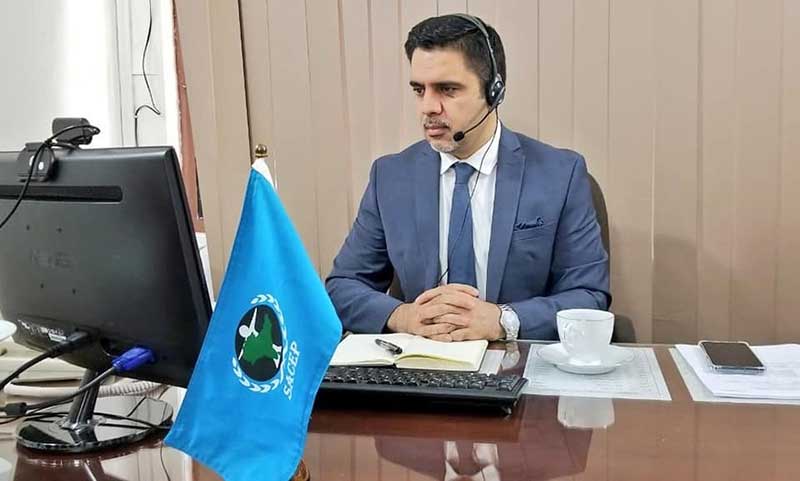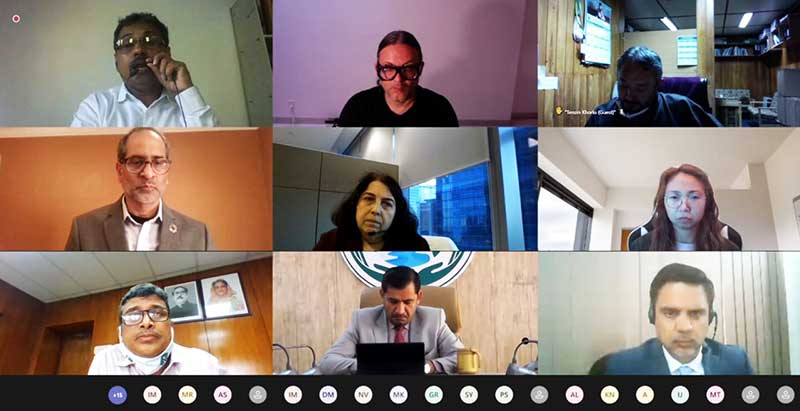April 01, 2021

Closing Remarks by SACEP Director-General Ambassador M. Ashraf Haidari at the Implementing Support Mission Wrap-Up Meeting on the Plastic Free Rivers and Seas for South Asia Project (PLEASE) on March 31, 2021

Excellencies,
Distinguished Heads of Delegation from SACEP Member-States,
Representatives from the World Bank and Parley for the Oceans,
Ladies and Gentlemen,
I am pleased to congratulate you all on successfully concluding a very fruitful Wrap-Up Meeting of the Implementing Support Mission of Plastic Free Rivers and Seas for South Asia Project, which we abbreviate as PLEASE. We have reached this stage, following six weeks of productive meetings with SACEP’s National Focal Points, all of whom I would like to thank for their active participation in the meetings, which culminated to our Wrap-Up gathering today.
I assumed the position of the SACEP Director-General, following the departure of my predecessor and fellow Afghan, Dr. Abas Basir, who was recalled by the Government of Afghanistan to take up the position of Minister of Higher Education. I wish to take this opportunity to thank all SACEP National Focal Points for the excellent cooperation, which they have extended to the Secretariat and my able colleagues, as we look forward to working with them during the remainder of Afghanistan’s term in the Director-General position.
And in this connection, I would like to note that the protection, management, and enhancement of environment at home and in our wider region is one of the top priorities of H.E. President Ashraf Ghani. He articulated Afghanistan’s position in this regard, in the recent Heart of Asia–Istanbul Process Ministerial Conference in Dushanbe, Tajikistan, urging bilateral and multilateral cooperation to address the transnational challenge of climate change in South Asia and the rest of the world.
Ladies and Gentlemen,
As you know all too well, plastic waste pollutes land, air, and flows into river systems and ultimately into the oceans. And this poses national, regional, and global threats to sustainable development with far-reaching economic, ecological, and public health consequences.
The qualities that make plastic useful—including lightness, durability, strength, versatility, and low production costs—have shot up demand for its ever-growing use. But the mismanagement of plastic waste has created a mounting pollution crisis, which continues eroding ecological systems like rivers and oceans.
The global production of plastic is currently estimated to be around 300 million tons per year. And plastic pollution in the marine environment alone claims approximately 9.5 million tons, with 1.5 million tons ending up in the oceans annually. The South Asia region is the third largest contributor to plastic waste globally. And this is estimated to double by 2050, unless effective, tangible action is taken by all of us now and today.
Knowing the gravity of the plastic pollution threat to our environment, the United Nations Environment Assembly has adopted several resolutions on Marine Litter and Microplastics. The resolutions support the development of marine litter action plans, including an assessment of the effectiveness of or gaps in relevant international, regional, and sub-regional governance strategies and approaches to addressing the challenge of plastic pollution.
Through the PLEASE project, SACEP looks forward to doing our part to find a long-term solution to the problem of plastic pollution in South Asia. The project interventions will be implemented in all eight SACEP member-states. As you were informed today and during the country meetings, the project will introduce new and promising initiatives that promote reduction of plastic pollution. This is done by adopting circular approaches where regional cooperation and coordination could help better recognize, share, and replicate good-practice models to reduce the stock and flow of plastic waste.
One such approach is supporting the Competitive Block Grant Investments to reduce plastic waste with the objective of identifying, verifying, and investing in circular plastic economy solutions, while facilitating the exchange of knowledge, technology, and awareness of the proposed solutions.
Ladies and Gentlemen,
The involvement of the private sector is the key to successfully addressing the plastic pollution. Hence, the project will help facilitate the region’s transition toward a more circular economy, increasingly free from plastic pollution. This effort should improve regional and national strategies, policies, action plans, and standards based on better analytics and through public-private sector engagement, dialogue, and collaboration.
To this end, the PLEASE project will provide support to develop and improve national and regional plastic pollution mitigation strategies, policies, and industry standards. At the same time, it will provide technical and other necessary support to relevant institutions to identify, prioritize, collect, and analyze lifecycle data and identify data issues and gaps.
The PLEAEE project has resulted from the hard teamwork of SACEP, the World Bank, and Parley for the Oceans, amid the global COVID-19 pandemic and the challenges it has posed. Despite this, however, I am pleased that with the support of each other, we have been able to develop this project within a short period of time, meeting all inter-institutional deadlines and requirements. Indeed, this proves the capacity and firm commitment of the SACEP to the implementation of the PLEASE project.
Ladies and Gentlemen,
I can assure you all that with increased resources and enhanced technical capacity, SACEP can and will deliver more tangible results for the betterment and protection of our environment in the region.
Hence, we are grateful to the World Bank and Parley for the Oceans for providing a grant of USD $50 million for the PLEASE project and selecting SACEP as an implementing partner. This win-win partnership entails many co-benefits, including capacity-building on both sides to undertake similar and larger projects for co-implementation in the future.
In this light, I wish to call upon our member-states to follow suit by increasing their contributions to SACEP. Additional financial and human resources support from our member-states in accordance with their means would enable us to build manifold on our many successes so far, as well as on the lessons we will have learned from co-implementing projects such as the PLEASE.
Finally, on behalf of SACEP, the World Bank and Parley for the Oceans, I wish to thank all the able delegates here for representing the leadership of our member-states. We greatly appreciate your cooperation so far, and look forward to your active participation in implementing this vital project.
Of course, doing so will help address the crisis of plastic pollution, mitigating its impact on public health across South Asia as a very vulnerable region to climate change. To this end, I have no doubt that the commitments we have made today will help change for the better the lives of over a billion people in South Asia.
That is why I am confident that together, we can and must achieve the goals of the PLEASE project to help free our naturally endowed region from the threat of plastic pollution. Thank you!